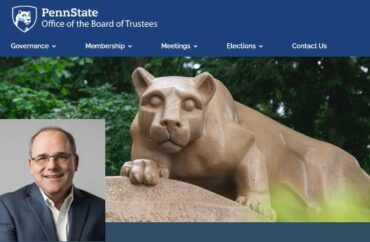
Pennsylvania’s open records exemptions for universities is highly unusual: scholars
A Penn State University trustee who ran on a fiscal responsibility platform says he has been denied access to financial records about its $5 billion endowment.
Now, after facing a “runaround” for years, Trustee Barry Fenchak said he is suing the university in an attempt to gain access to the documents.
“For raising issues, requesting information I am legally entitled to, and trying to engage my fellow trustees in honest deliberation I have been stripped of committee assignments, issued a Letter of Censure from the Executive Committee, and had my social privileges revoked,” Fenchak wrote Wednesday in his personal newsletter, shared with The College Fix.
Fenchak (pictured) said he felt he had “no choice” but to take legal action after his requests to review financial records were denied.
His lawsuit, filed in July, also has renewed concerns about transparency at state universities. The Pennsylvania Right-to-Know Law does not require universities to follow the same disclosure requirements as other public entities, Brechner Freedom of Information Project Director David Cuillier said.
“The downside of the secrecy is enormous. I can’t imagine a university that had a [Jerry] Sandusky, that they would continue to think hiding essential public records is a good idea,” Cuillier, of the University of Florida, told The Fix in a Monday phone interview.
Sandusky, a former Penn State assistant football coach, was convicted of sexually abusing boys in the locker room and at his home. Several prominent university officials were accused of attempting to cover up the scandal.
Lawsuit seeks endowment records
Fenchak, an investment advisor, was elected by alumni to the PSU Board of Trustees in 2022. Once on the board, he said he began seeking details about the university’s finances, believing it his responsibility as a trustee to help oversee such matters.
His lawsuit quotes a PSU Office of Investment Management document that states the board of trustees maintain “the ultimate oversight of the University’s investment assets.”
One of the issues that concerned him was a “significant jump in administrative fees” involving the university’s $5 billion endowment that were “paid to investment fund managers beginning in 2016,” Fenchak wrote in a July post on his website.
Fenchak said he repeatedly asked for information about the endowment, but the board rebuffed his requests. Eventually, he said he decided that the only solution was to sue.
“My complaint is straightforward: by Pennsylvania legal statute Title 15 Section 5512(a), a trustee of a nonprofit corporation has the right to ‘access and copy the University’s books, records, and documents so long as doing so is reasonably related to the performance of the duties of a trustee.’ If the leadership refuses to provide that access, they are breaking the law,” he wrote.
However, Fenchak also said he is not making any “allegations of malfeasance or gross negligence” about the handling of the university’s finances; he just wants access to the records as a trustee.
Meanwhile, another move by the board Tuesday raised even more concerns.
The trustees voted to change their bylaws to give current members more power over the selection of the candidates who are elected by alumni – like Fenchak. It passed 24-8, according to the Centre Daily Times. Some trustees are alumni-elected, others are appointed.
Advocates said the change will ensure candidates for the board are qualified and have skill sets needed to help oversee the university. However, opponents argued the new bylaws are a “blow to the democratic process,” according to the report.
“At a time when we’re being challenged to be more transparent, this process would make our elections less transparent,” Trustee Jay Paterno told the newspaper.
Responding Wednesday, Fenchak wrote in his newsletter that the change basically means he’s “banned for life, and ineligible to run for trustee again, ever.”
PSU says it’s working to increase transparency
Penn State spokesperson Wyatt DuBois told The Fix in an email Monday the university does not comment on pending litigation.
However, he said trustees do receive “robust data and information, designed to educate them and enable decision making and oversight.”
“Penn State is committed to transparency and has taken several steps to further expand the level of information that it shares with the public,” DuBois said.
These include an accountability page on its website and an annual report with financial information, campus safety reports, and data on enrollment, demographics, graduation, and retention rates, and more, he said.
DuBois also noted that PSU is a “state-related rather than public university,” and therefore “not subject to Pennsylvania’s ‘Right to Know Law.”
Shannon Harvey, assistant vice president and secretary of the PSU Office of the Board of Trustees, told The Fix in an email Thursday the board has “nothing further to add” to the university’s statement.
State’s open records exemption for universities is unusual: scholars
Terry Mutchler, founding executive director of the Pennsylvania Office of Open Records, said Fenchak’s lawsuit is “highly unusual.” She now chairs the transparency and public data practice at Obermayer, a law firm based in Philadelphia.
“It is a rarity to see a sitting board member have to take legal action for documents for the work that they oversee,” Mutchler told The Fix in a phone interview Thursday.
Unlike 47 other states, Pennsylvania does not subject universities to its right to know law – a situation Mutchler said she would like to see change.
“When you receive $250 million [tax dollars] as part of your funding, I believe there needs to be public transparency,” she said.
Cuillier with the Freedom of Information Project agreed, telling The Fix: “People are less likely to steal and cheat and do bad things when the public has the opportunity to see what they are doing. It’s just that fundamental.”
In November, the Pennsylvania legislature passed a law requiring more transparency from universities. Sponsored by Rep. Katie Klunk, the legislation increases the list of records universities must make public, including top salaries, enrollment data, and meeting minutes by its board of trustees.
Klunk did not respond to two requests for comment over the past week, asking about transparency concerns at state universities and her legislation.
But Cuillier described the bill as “window dressing,” saying it should have gone farther.
“Just make the universities subject to the open records law,” he said. “It’s a pretty simple fix.”
MORE: First Amendment groups criticize transparency laws after Republican asks for university emails
IMAGE: K. Jensen/Shutterstock, Barry Fenchak





Please join the conversation about our stories on Facebook, Twitter, Instagram, Reddit, MeWe, Rumble, Gab, Minds and Gettr.